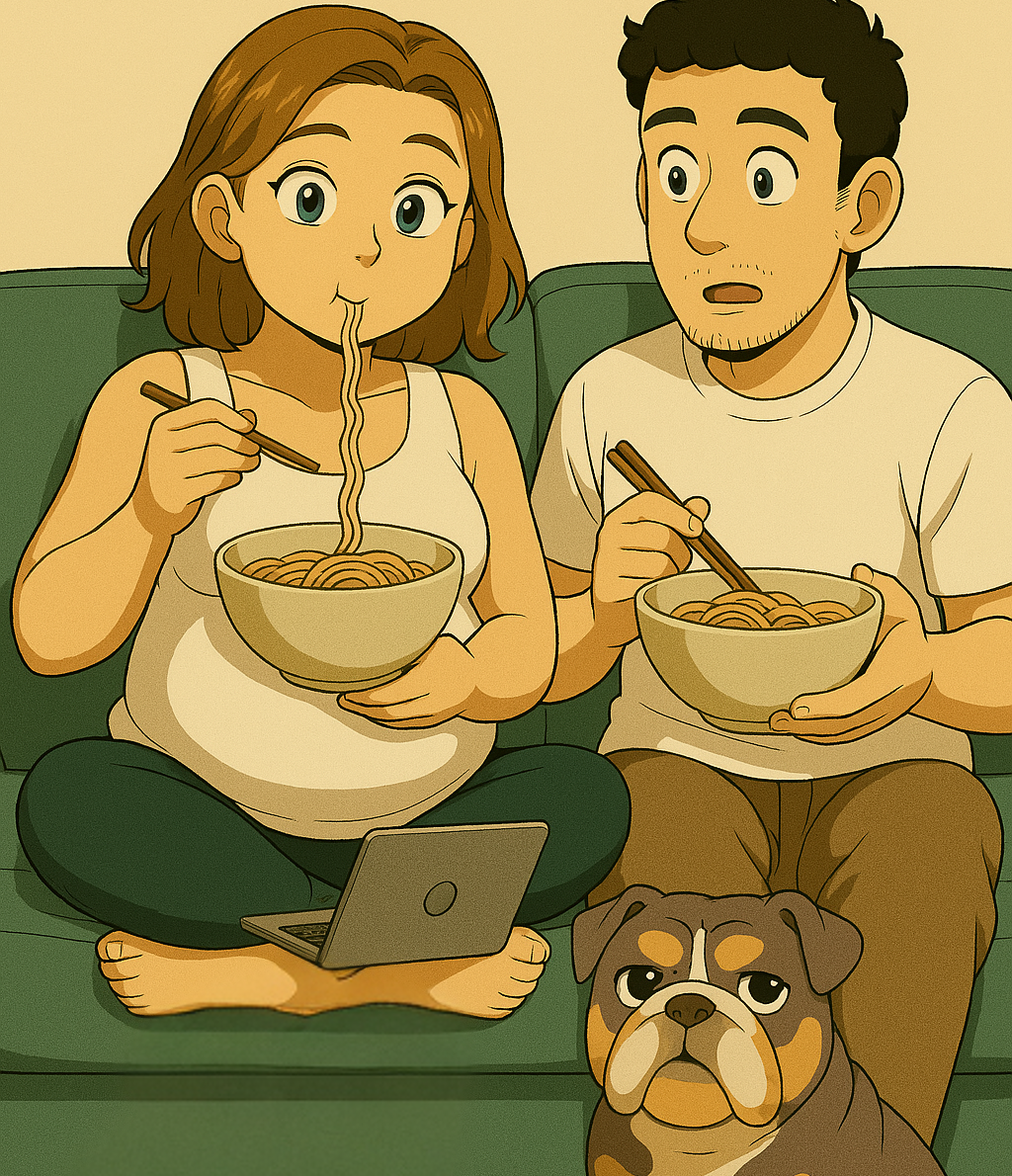Physical Address
304 North Cardinal St.
Dorchester Center, MA 02124
Physical Address
304 North Cardinal St.
Dorchester Center, MA 02124

What started as a seemingly innocent dinner conversation quickly spirals into a bizarre blend of horror, sci-fi, and a sprinkle of misguided wellness. “Should I eat my placenta?” Jodie asks, chopsticks in hand, balancing her ramen on a third-trimester belly. Tom’s spoon pauses mid-air. A beat passes. And then… the drama begins.
On one side of the sofa, Tom’s imagination leaps into a full-blown horror flick – he sees the placenta morphing into a leggy alien creature bursting from Jodie’s body. He’s horrified. Tassie the bulldog, however, is intrigued – is it food?

On the other side, Jodie dreams of power. Not just any power – Lucy power. You know, Scarlett Johansson tapping into 100 % of her brain’s potential from a mystery drug? Jodie sees her placenta, delicately freeze-dried and encapsulated, transforming her into a super-intelligent being who can write a novel, solve climate change, and do the food shop—all before lunch.

This post blends humour and animated fantasy frames with real discussion. We’ll look at:
🔹 The history of placentophagy (yeah, that’s the actual word)
🔹 Different methods people use—raw, smoothies, pills (please, not raw)
🔹 Reported benefits vs. scientific evidence
🔹 Anecdotes and lived experiences from real parents
🔹 The surprising link between mammals and placenta consumption
🔹 Why some people do it—and why it’s all deeply personal
Placentophagy is defined as the ingestion of a human placenta postpartum, in any form . Of the more than 4,000 species of placental mammals, most routinely consume the afterbirth—humans being a notable exception until very recently. Maternal placentophagy re-emerged in the U.S. among midwives in the 1970s and has since gained a small but growing following in Western cultures, thanks in part to celebrity endorsements and the natural-birth movement .
There’s more than one way to placenta:
Anecdotal perks frequently cited by parents who’ve tried it include:
In a survey of 189 women who consumed their own placenta, 95 % reported “positive” or “very positive” experiences—most commonly improved mood and lactation .
But scientific studies paint a different picture:
The CDC warns that placenta encapsulation does not reliably eliminate infectious pathogens. In 2017, they linked one infant’s late-onset Group B Strep sepsis to contaminated placenta capsules and advised against ingestion without strict processing standards .
In the UK, placenta for oral ingestion is explicitly not classified as relevant material under the Human Tissue Act—meaning there’s no formal regulatory framework for placentophagy . If you’re considering it, always:
When I spoke to my midwife, she was open and supportive—she’s seen plenty of her clients opt in, and shared a simple prep example: cube and freeze your cleaned placenta in berry-blend batches, then blitz one smoothie a day until it’s gone. I haven’t decided for sure which method I’ll use, but knowing this hack is on the table makes the idea feel more approachable.
Most mammals—cats, dogs, elephants, even guinea pigs—eat their placenta. Evolutionary biologists suggest this instinct aids in mother-young bonding, masks birth scents from predators, and may release a natural opioid-enhancing factor (POEF) that eases postnatal pain .
I haven’t given birth yet, my placenta is still warm and cozy and keeping my baby safe completely oblivious to this discussion surrounding it’s future cannibalism—but this is your front-row seat as I navigate the decision. Once baby arrives and I choose a prep method (smoothie hack or otherwise), I’ll share:
👉 Watch this space: updates will drop here on the blog and on Instagram. If you’re curious, contemplating, or just love a good birth-woe saga, subscribe or follow—let’s swap notes on this wild postpartum experiment!
Pregnancy and birth deliver enough surprises—why not navigate the weird ones together?
— Jodie
Further reading and resources:
🏥 NHS Postnatal Care
https://www.nhs.uk/conditions/postnatal-care/
🧬 Human Tissue Authority
https://www.hta.gov.uk/
💊 Placenta Practice (UK-wide encapsulation service)
https://www.placentapractice.co.uk/
🔬 Placenta Plus (laboratory-based encapsulation)
https://placentaplus.co.uk/
🌿 Birth Baby Balance (encapsulation & other placenta remedies)
https://www.birthbabybalance.co.uk/placenta-encapsulation/
💚 Mind (mental-health charity)
https://www.mind.org.uk/
🤰 PANDAS Foundation (pre- and postnatal depression support)
https://www.pandasfoundation.org.uk/